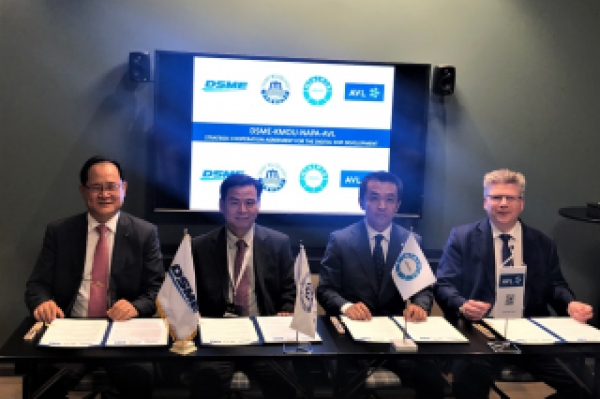News
Latest news
DSME, NAPA, KMOU, and AVL Team Up on Developing Digital Ships
Daewoo Shipbuilding and Marine Engineering (DSME), Korea Maritime and Ocean University (KMOU), NAPA and AVL have signed a strategic cooperation agreement to develop digital ships and related strategic solutions.
The deal was signed at Nor-Shipping 2019 exhibition in Oslo held from June 4 to 7.
As explained, the agreement will combine the four parties’ expertise in naval architecture and shipbuilding, engines, big data, and software development to pioneer new solutions that combine all of these elements for the first time.
Specifically, the collaboration will cover all aspects of creating comprehensive digital twins — from the acquisition and processing of quality engine room data, ship performance and meteorological data to the training, simulation and human machine interface that will be necessary to turn insights from engine data into practical efficiencies.
“The development of digital twin ship and engine is one of the most exciting outcomes of the recent surge in maritime digitalization and development of the Internet of Things. By creating a virtual, real-time copy of engine equipment, we can better monitor, analyze, and predict performance, leading to safer and more efficient operations,” Odin Kwon, CTO of DSME, commented.
“Digital twins bring together a range of different fields of expertise, requiring hardware, software and operations to work together. This is why collaboration is essential if this technology is to mature… We’re excited to work together to develop digital twin technology and a platform that will make future generations of ships safer and smarter,” Kwon added.
“We are actively entering into digital era in the industry nowadays which could be a basis for the development of autonomous ship. Building a digital platform should be well balanced between actual application of technology and academic basis,” Professor Deog Hee Doh from KMOU said.
He further said that KMOU faculty members have started developing a platform in which AR/VR and digital twin technology are embedded. According to the professor, the university will focus on providing a knowledge-based platform in the fields of simulations and communications related to digital ships extending to AR/VR.
“New generations of vessels will set the standard for decades to come, and digital infrastructure will be just as important as the physical and mechanical elements of a newbuild,” Naoki Mizutani, Executive Vice President, Shipping Solutions at NAPA, noted.
Each partner brings a different angle to the collaboration, coordinated by DSME. NAPA will develop digital twin ship models with digitalized components and a real-time simulation platform to integrate between engine models and ship models.
Meanwhile, AVL will develop the simulation tools and methodologies that the partnership projects will require.
Additionally, KMOU will contribute by providing the existing infrastructure as a basis for further development and optimization.
Reference: worldmaritimenews.com
Loginno: Soon-to-Be First Digital Shipping Firm Selected
The soon-to-be first digital shipping company, chosen out of 17 global applicants, is set to be revealed on June 6 in Oslo, Norway, during Nor-Shipping, the largest global shipping event of 2019.
Earlier this week, the final scoring of the competition’s contestants had been performed, and a notice to the winning shipping company had been sent.
The news would be revealed at the end of a Contopia-themed panel of experts discussing the various use cases for the first digital shipping company, according to Loginno, the company that is creating the world’s Internet-of-Shipping-Containers infrastructure named Contopia (Container Utopia).
The digital shipping company would use the disruptive Israeli IoT technology for end to end supply chain visibility.
Ahead of the The Contopia Factor competition winner announcement, Loginno is warming up the engines with a surprise reveal of the technological foundation upon which the winning shipping company’s digital infrastructure will be built.
In a closed event held in Tel Aviv, Loginno unveiled the 5th generation of its critically acclaimed AGAM device, whose unique installation method as a standard container vent allows every container service depot to install it with no training.
While this operational side of Loginno’s patent-protected hardware was already known, founder Amit Aflalo, got into the technical specifics of what he dubs “both the smartest and the most affordable shipping container brain in existence today.”
“It is the only wide-area communications device with battery life of 10+ years without recharge, effectively making it a permanent solution for every shipping container, never to be taken off during its entire lifetime of usage,” Aflalo added.
Reference: worldmaritimenews.com























